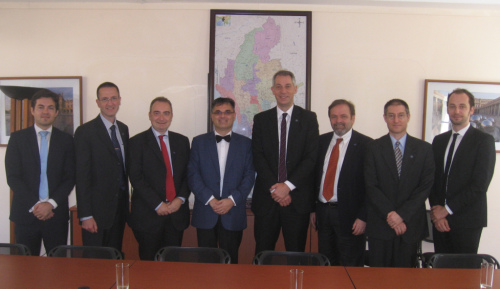ECCT trip to Myanmar

Besides meeting with their counterparts, the ECCT delegation met with Roland Kobia, the EU's ambassador to Myanmar, Olivier Richard, the French ambassador to Myanmar (who was previously the French Representative to Taiwan), the director of the Taiwan Trade Centre, Yangon Branch (a branch of TAITRA) and the chairman and representatives of The Republic of the Union of Myanmar Federation of Chambers of Commerce and Industry (UMFCCI). On the final day of the visit, the delegation took a trip to the Thilawa Special Economic Zone (SEZ) on the outskirts of Yangon.
The trip provided delegates with an update on the business and regulatory environment in Myanmar and the business opportunities given Myanmar's large, youthful population, abundant land and natural resources.
Myanmar is in a transitional phase from authoritarian to quasi-civilian rule after the election victory of the National League for Democracy (NLD) on 8 November 2015. A new president took office on 1 April 2016 and key cabinet ministers have been announced. While NLD leader Aung San Suu Kyi is barred by the constitution from assuming the presidency, the role has been taken on by Htin Kyaw, a well-educated diplomat and close personal friend of Suu Kyi's, while Suu Kyi herself will take on key leadership roles in the government.
The political opening for business, social and labour laws has been set in motion. The EU has no sanctions left in place, except on the sale of weapons.
The current business environment has been described as difficult but improving. While the constitution is regarded as far from perfect, the situation is a marked turnaround from how things were after the military failed to recognize election results in 1990, which were also won by the NLD.
There are currently 111 European companies officially registered in Myanmar, 69 of which are already operating in Myanmar. The number of Taiwanese companies operating in Myanmar has doubled from around 200 in 2012 to around 400 now.
Europe has a positive image in Myanmar compared to the United States and China.
Myanmar's legal system is based on UK laws dating back to the British colonial era, a number of new laws introduced in the 1990s and a new wave of laws since the opening up in 2011.
Myanmar remains a poor country. 70% of the population lives in rural areas. The middle class remains small at only about 20% of the population, but has great potential to grow. Agriculture remains a major part of the economy but manufacturing has risen from around 12% to about 30% of economic output in the last few years. Gas is the country's number one export item. Mining (for copper, gold and precious stones) also remains an important industry. There are very few large companies but a number of medium-sized firms in Myanmar.
There are good business opportunities, especially in undeveloped sectors such as agriculture, food processing, retail and consumer goods, but entry barriers are high given the high cost of land and limited availability of good buildings, which puts a huge premium on prime property. In addition, the lack of a reliable power supply, infrastructure and skills (such as engineers) are obstacles to development. Housing prices are high not only because of land prices but because most of the construction materials have to be imported while a lack of skills locally means having to hire expatriates on expensive packages.
The easiest way to set up a company in Myanmar is in one of the country's three Free Economic Zones (FEZ). Setting up in an FEZ provides multiple tax benefits, access to power supply and other infrastructure as well as a one-stop administration process. The Thilawa FEZ, located 20 kilometres South-East of Yangon and just 1.5 kilometres from a deep sea port, is the most developed of the FEZs. Operations have already been set up in Thilawa by 25 companies and another 62 from 15 countries (including one from Sweden, one from the US, several Chinese and four Taiwanese) have reserved plots.
Myanmar has very cheap labour (average monthly wages are US$100) and very good demographics compared to other countries in the region (a young population and higher birth rate than its neighbours).
Telecommunications development has been rapid. A sim card used to cost over US$1,000. Now they are around US$1 and there are some 20 million sim cards in use all over the country.
While Yangon remains the main centre of business and trade, other cities also have potential for development. However, the northern states are not very significant for business.
Early movers with enough capital and know-how are likely to be big winners given the very large potential market of 50-60 million people (official census figures cannot be trusted to give an accurate number).
Some companies are shifting production to Myanmar but the benefits of cheap labour have to be measured against the disadvantages of a lack of power, other infrastructure and administrative difficulties and a lack of management skills and banking facilities.
The EU provides €100 million per year in grants to Myanmar to fund activities across the country in rural development, agriculture and food security.
Education is one of the priority areas for the EU. It is helping to advise on education policy and working with many international donors to upgrade educational facilities and skills, including vocational training.
